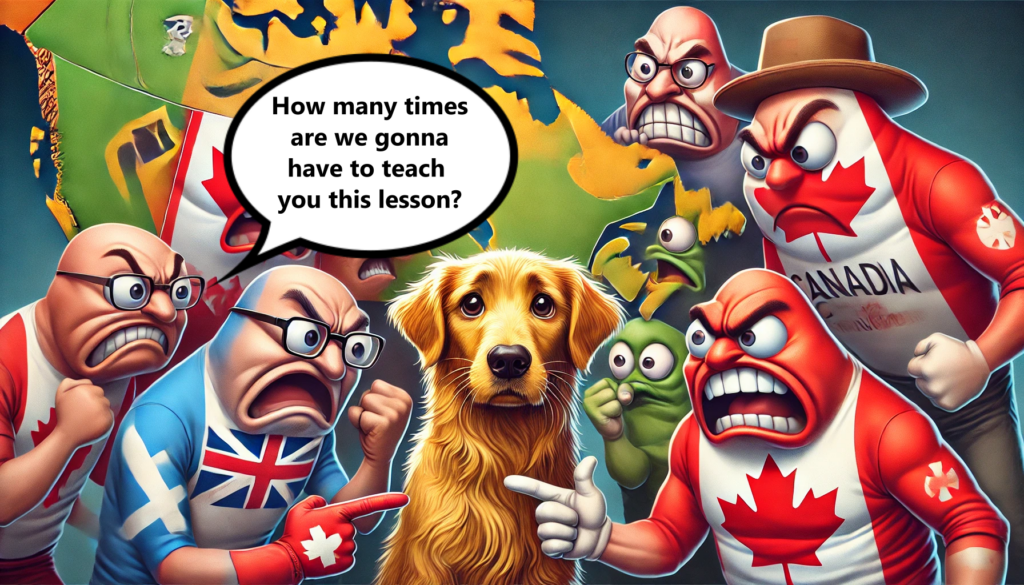In this week’s GME3, we‘re looking at an attempt to gain an injunction against the offshore gambling site Bodog in Manitoba, a determination from the U.S. Copyright Office clarifying how AI can be used in copyrighted works, and the expansion of the social media platform X’s lawsuit against advertisers to include brands like Lego, Nestlé, Pinterest, and more. Read the full stories below!
Gambling
Ain’t Nothing But a Bo-Dog
A coalition of Canadian gaming agencies is seeking an injunction to block offshore gambling site Bodog from operating in Manitoba, hoping to set a precedent in the fight against illegal online gambling. Manitoba Liquor & Lotteries, acting on behalf of the Canadian Lottery Coalition, argues that Bodog is unlawfully diverting revenue from its provincially authorized platform, PlayNow.com. The coalition, comprising gaming bodies from several provinces, views this as a test case to strengthen enforcement against offshore operators.
According to the court application, Bodog, which accepts players across Canada, except in Quebec and Nova Scotia (after exiting the East-coast province in October last year), allegedly misrepresents itself as a legal and trustworthy platform through “materially false and misleading statements.” An affidavit from a digital forensic analyst states Bodog actively targets Canadian bettors through advertising. Despite requests to cease operations in Manitoba, the company has refused to comply.
The case also raises concerns about money laundering. A recent report by FINTRAC, Canada’s financial intelligence unit, warns that drug traffickers are using offshore gambling sites to launder illicit funds. The Manitoba government recently announced new measures requiring casinos to report suspicious transactions to law enforcement.
Spencer Murch, a researcher specializing in gambling behaviour, warns that merely cracking down on illegal sites is not enough. He argues that governments must also prioritize harm reduction over revenue generation when expanding legal gambling. Public health experts caution that increased online gambling access correlates with higher rates of gambling-related problems, emphasizing the need for responsible regulation.
This legal battle could set a national precedent, shaping future efforts to curb offshore gambling while balancing consumer protection and government revenues. Make sure to check in here at the GME blog for future updates!
Media
AI Can’t Draw the Line
The U.S. Copyright Office has clarified that artists can copyright works created with AI assistance, provided that human creativity is evident in the final piece. The report, released Wednesday, underscores the importance of human contribution in securing copyright protections. If an artist makes creative modifications or arrangements to AI-generated content, the work may qualify for copyright. However, fully AI-generated works, where a person simply prompts a machine, remain ineligible.
This clarification comes amid increasing copyright applications for AI-influenced creations and follows a review launched in 2023 that gathered input from various stakeholders, including AI developers, musicians, and actors. The Copyright Office’s stance aligns with its long-standing position that copyright exists to protect human authorship, not machine-generated content.
The report does not address a separate but growing controversy: the use of copyrighted works to train AI models without permission or compensation. Many authors, visual artists, and news organizations have sued AI companies over alleged copyright infringement, with cases still working through the courts. The Copyright Office is preparing a future report to examine AI training practices, licensing concerns, and potential liability issues.
This decision is likely to have a significant impact on creative industries such as music, film, and visual arts, providing clearer guidelines for artists using AI tools while reinforcing copyright protections based on human originality.
Entertainment
X Marks the Lawsuit
Elon Musk’s social media platform, X, expanded its lawsuit on Saturday to include several major brands, accusing them of illegally boycotting the platform after Musk’s 2022 acquisition of Twitter. Originally filed against the World Federation of Advertisers (WFA) and companies like CVS and Twitch, the amended complaint now names Lego, Nestlé, Tyson Foods, Abbott Laboratories, Colgate-Palmolive, Pinterest, and Shell.
The lawsuit alleges that WFA sought to enforce its brand safety initiative, the Global Alliance for Responsible Media (GARM), leading to a coordinated ad boycott. At least 18 GARM-affiliated advertisers reportedly stopped spending on Twitter globally or in the U.S. after Musk’s takeover, with others significantly reducing their ad budgets. X claims this cost the platform billions in lost revenue, with lingering financial repercussions.
X’s lawyers argue that social media platforms should set their own brand safety standards rather than allowing advertisers to dictate them, which they say stifles competition. The newly added companies have not yet responded to the allegations.
Since Musk took over, Twitter – now X – has undergone significant changes, including reinstating previously banned accounts, eliminating content moderation teams, and reducing oversight on harmful content. The backlash from advertisers has been substantial, with reports indicating that X has lost 50 of its top 100 advertisers.
GME Law is Jack Tadman, Zack Pearlstein, Lindsay Anderson, Daniel Trujillo, and Will Sarwer-Foner Androsoff. Jack’s practice has focused exclusively on gaming law since he was an articling student in 2010, acting for the usual players in the gaming and quasi-gaming space. Zack joined Jack in September 2022. In addition to collaborating with Jack, and with a keen interest in privacy law, Zack brings a practice focused on issues unique to social media, influencer marketing, and video gaming. Lindsay is the most recent addition to the team, bringing her experience as a negotiator and contracts attorney, specializing in commercial technology, SaaS services, and data privacy.
At our firm, we are enthusiastic about aiding players in the gaming space, including sports leagues, media companies, advertisers, and more. Our specialized knowledge in these industries allows us to provide tailored solutions to our clients’ unique legal needs. Reach out to us HERE or contact Jack directly at jack@gmelawyers.com if you want to learn more!
Check out some of our previous editions of the GME3 HERE and HERE, and be sure to follow us on LinkedIn to be notified of new posts, keep up to date with industry news, and more!




